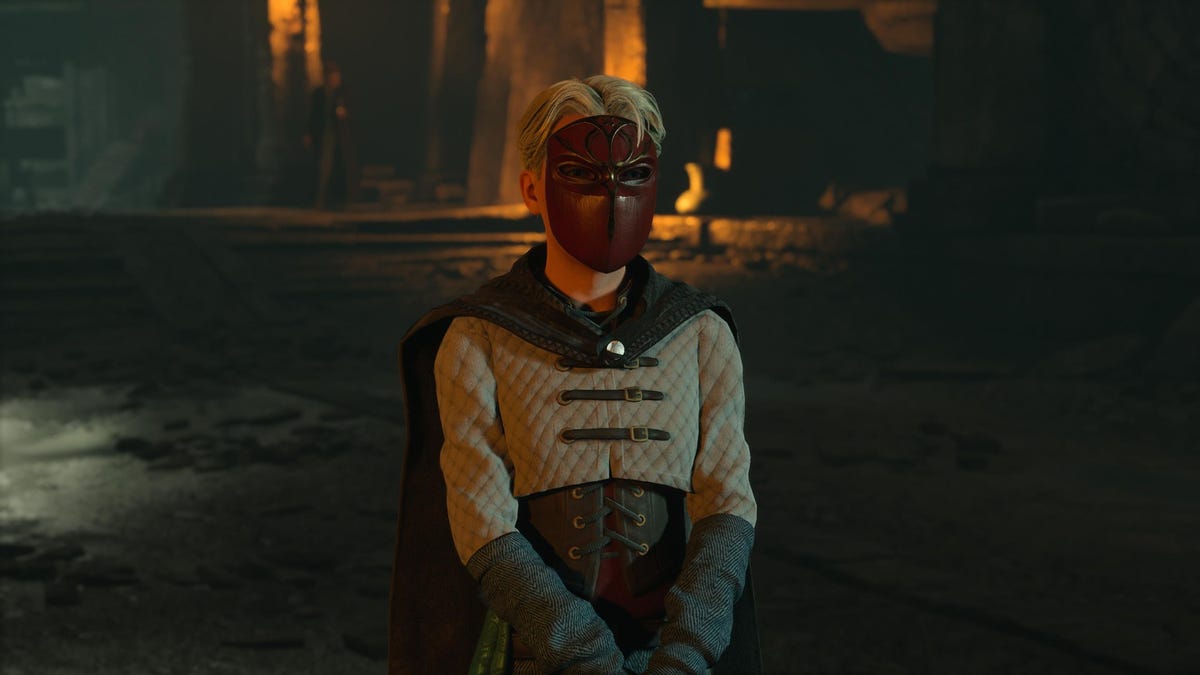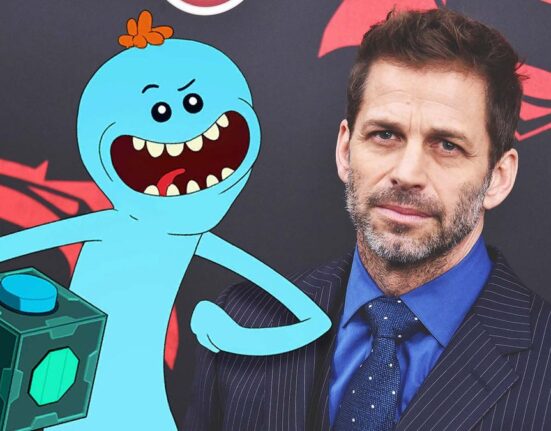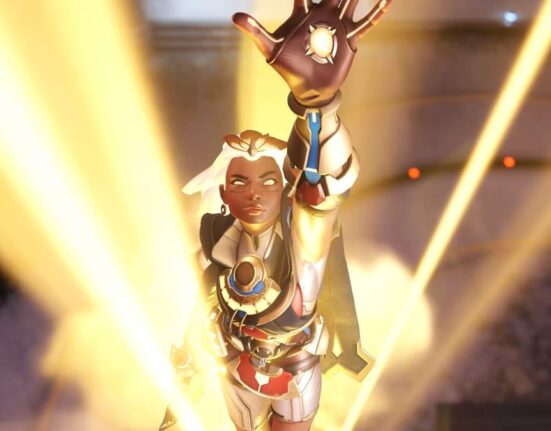I boot up Hogwarts Legacy and step away to refill my coffee cup. Thanks to the PS5’s quick resume mechanic, my character is staring at me from the start screen before I even get a chance to add oat milk to my brew. I gaze, absentmindedly, as the boar’s head mounted on the wall behind her snarls and startles her, as she playfully tries to snatch a Golden Snitch out of mid-air, as house-elf Deek appears behind her and waves goodnaturedly. I am unnerved.
Read More: The RPG Elements In Hogwarts Legacy Undermine Its Magic
This wide-eyed, curious young student isn’t the same person as my Hogwarts Legacy character, who just learned the Cruciatus curse and has been using it on every man, woman, and goblin she encounters. It feels like an imposter, an empty, good-aligned character who would never bully students or learn Unforgivable Curses or contribute to the widening chasm between wizards and goblin-kind. But even if she did do those things, it would be for a good reason, guys.
That incongruity exists throughout the entirety of WB Games’ RPG, which aims for an adult take on the Harry Potter universe but ends up parroting the same childish, black-and-white morality set forth by J.K. Rowling all those years ago. The means by which good people achieve things doesn’t matter, because they are good. Bad people are bad, and their actions are always so. Hogwarts Legacy doesn’t want to judge you, as its developers boasted before its debut. But with no real moral stance and a puzzling absence of the nemesis system WB Games worked so hard to patent, Hogwarts Legacy is toothless.

G/O Media may get a commission

Up to 52% off
Custom Lenovo Laptops or PCs
Pick your processor, RAM, GPU, and more
Whether you are in the market for a new laptop or desktop or if you a specifically looking to build something to game on, you can do so here and you’ll save up to 52% off.
Where’s my nemesis

Nowhere is the lack of a morality or nemesis system more glaring and dissonant than in the sidequests. In these, you can make dickhead decision after dickhead decision with little to no repercussion.
If you rudely demand payment for what was initially meant to be a favor, the merchant you got one over on will greet you with glee immediately after and offer you a selection of their wares, smiling with an emptiness behind their eyes as if you Obliviated them. In one instance, I anger a merchant enough that he will no longer sell to me–but the game bizarrely still has his merchant icon floating in the space where he once was, and his voice hurls insults at me even though there’s no one standing there. But this merchant doesn’t have any items I can’t find elsewhere, so his disappearance makes no difference to me.
If you flat-out refuse to return a stolen Mooncalf named Biscuit to a goblin named Garnuff, suggesting that the animal (which was taken by poachers) is safer with you, he’ll sneer something about how wizard superiority is why goblins hate them and saunter off, but there are no repercussions beyond potentially radicalizing the dude.

But what if Hogwarts Legacy deployed the nemesis system from Middle-Earth: Shadow of Mordor? That system (which WB Games has exclusive rights to, remember) allows enemies to gain more power, learn more skills, or get promotions if they defeat you. Crucially, those enemies also remember what you’ve done—defeating an Orc in battle in Shadow of Mordor but sparing his life may make them immune to certain weapons, and there’s something oddly satisfying about encountering one who shouts “I remember you!”
What if, after you wronged him, Garnuff popped up in one of those Loyalist goblin camps dotted amongst the hillside, shouting something about Biscuit before firing a crossbow bolt at your head? How much more weight would your decisions have if pissing off a merchant resulted in them joining a fight against you later on? And what if Garnuff was, like some of the other enemies you encounter, marked as an Infamous Foe and therefore harder to defeat?
This addition would help assuage the feeling of weightlessness you get while playing Hogwarts Legacy. What’s the fun in being an asshole if you don’t get to reap the rewards? Where’s the Mass Effect-style “punching Khalisa Bint Sinan Al-Jilani because you’ve been a dick for so many hours” reward here? Without tangible change to storylines as a side effect of your decisions, Hogwarts Legacy gives you the tools to be an asshole just for asshole’s sake. And that’s not fun for anyone—except maybe J.K. Rowling.
Mooning about

Then there are the side quests centered around the students and staff at Hogwarts, which somehow offer even less moral clarity than the ones in countryside. You can contribute to the bullying of other students (refusing to return a family heirloom to one, potentially setting back merpeople/wizard relations by decades by ignoring another), but it never changes how your peers greet you. Because of this, I collect a girl’s lost gobstones, refuse to give them back, and get a stern talking to from her—but no one else looks at me sideways. Instead, they all continue to ask for my help as if I have, historically, been willing to do so with a smile on my face. My professors greet me with glee and not as if I’m an absolute fucking menace.
Then there’s the quest for groundskeeper Gladwin Moon, which has me scratching my head and wondering how many more takeless takes this game will throw my way. Moon asks you to help him remove statues that have been left all over the castle and beyond as a means to mock him. You see, once a boggart jumped out at him while he was in Hogsmeade, and it took on the shape of a demiguise (a cute, monkey-like creature that can tell the future). A bunch of people saw, and now one of them is placing statues of a demiguise holding a little moon (get it, Gladwin Moon?) everywhere to torment him. Moon, during all of your encounters, seems suspiciously drunk, which we’ll get to later, but otherwise it’s evident he’s the victim of a cruel prank.
You’ll want to see this side quest through because you’ll be able to get the Alohomora (lockpicking spell) and all its tiers, but once you figure out who’s been torturing Moon, the situation gets hazy—it turns out, Moon is being bullied by someone that he used to bully years ago. The man, a posh wizard called Piers Pemberton, says that Moon was the worst during his time at Hogwarts, calling him “Pigtail Piers” and just generally making his school years miserable. Pemberton, while clearly a victim in his childhood, gleefully tells you that he’s happy Moon is now the Hogwarts caretaker, because it’s blue-collar, poor people work. This off-hand remark gives me pause, but I go and tell Moon that Pemberton is the guilty party.
Moon’s reaction to learning that one of his former victims is now his torturer is little more than “oh that guy, he’s such a laugh!” Later, he sends a message via owl that basically says, “I confronted him at the pub and we had a laugh about it.” So two people were terrible to each other and now they’re getting drunk about it? And one of those people, Moon, seems to have a bit of a drinking problem, but now I’ve cleared the path for him to regularly go back to the pub and hang out with class traitor Pemberton? There’s no logic here, no satisfying solution, just shitty people being shitty. At least you can break into everyone’s homes and steal their shit thanks to Moon’s lock-picking spell…
Defending the Dark Arts

Famously, the central plot of Hogwarts Legacy is rooted in problematic anti-Semitic tropes (Rowling’s goblins are long-considered to be harmful depictions of Jewish stereotypes) and the exhausting protection of a status quo (those goblins, frustrated with being considered lesser-than, have taken to violence to gain equality, and in our society, that’s a no-no). There are others who have spoken about this at great length, and how your character’s quest to stop an evil goblin from gaining too much power is littered with the same kinds of hand-wringing and bemoaning heard after the BLM protests of 2020, or whenever marginalized peoples demand equality in a manner deemed uncouth by the ruling class.
The plot of Hogwarts Legacy is mealy-mouthed and soft, like a bumbling politician confirming that trans people do, in fact, have rights, but uh, we just don’t want them, uh, around children or uh, doing drag shows because all drag queens are trans right? But what makes its moral cowardice, its inability to actually say anything of worth, even more ridiculous is that, no matter what you do, its ending doesn’t really change all that much.
Yes, you can practice the Dark Arts in Hogwarts Legacy, but doing so makes little narrative difference for your character. Choosing to go down the path laid forth by Salazar Slytherin alongside fellow student Sebastian Sallow will piss off your peer Ominis Gaunt, but it doesn’t have any real tangible side-effects, except for Sebastian, the poor chap. He’ll be alienated by what’s left of his family, but aside from deciding whether or not you wanna rat him out and get him expelled, his fate makes no difference when it comes to the game’s actual “good” or “evil” ending.

You can get the good ending even if you crucio-ed everyone in your path, or learned the killing curse and wielded it without remorse, or did the Imperius curse on Ominis so that you could keep practicing your dark magic without his interference (that last one is, strangely, a suggestion made by Ominis himself). And even choosing the evil ending, where you embrace the power of a repository of ancient magic despite your mentor telling you not to, doesn’t change the “ultimate” ending—your house winning the House Cup because of your bravery.
As my partner watches me take my character down the Dark Arts path in Legacy, he wonders aloud: “why isn’t this the main conflict?” Why isn’t a new, magically powerful student’s dalliance in the Dark Arts the hinge upon which the entire plot rotates? How much more interesting would future games be (and yes, let’s admit, there will likely be more) if your decision to go down the path of darkness felt tangible and dangerous and like it would alienate so many of those in your life? How, if you complete the evil ending, can Professor Weasley even look you in the eye?
If Hogwarts Legacy actually let its characters and its story take moral stances, if it had consequences for your actions and let you choose whether or not you spend your time at Hogwarts as more of a Harry Potter or a Tom Riddle, it would have something to say, it would have teeth. Instead, playing this game feels like a toddler gumming a plastic play toy.







Leave feedback about this